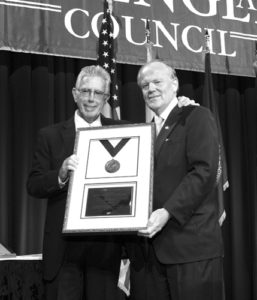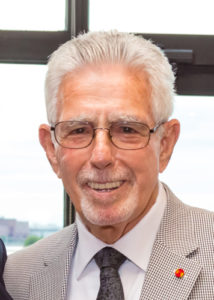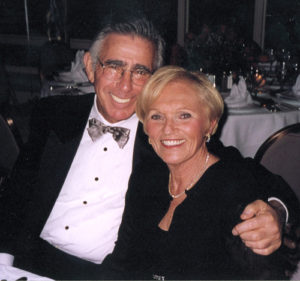Ride to Remember: Don Rodman, late philanthropist, epitomized selfless giving
By Jay TurnerHe rose from hardscrabble beginnings to reach staggering heights of personal and professional success. He was, by his own admission, lucky in love and rich in family and friends. He hung out with sports legends and captains of industry and attained a certain measure of celebrity status himself as both a business icon and one of the region’s most prolific and hardworking philanthropists.
Yet it was the motivation behind all of that giving, often done with little fanfare, or in some cases, total secret, that will forever define the legacy of Canton’s Don Rodman.
As he noted in Rodman’s Ride and Other Stories of Giving, “What most people don’t understand about philanthropy is that it is not just about raising money or even giving money. It is about creating opportunities for people to share experiences of goodwill.”
And for well over a half century right up until his death last week at the age of 88, Rodman, through his annual Rodman Ride for Kids and numerous other charitable ventures, did exactly that, providing life-changing experiences and memories for thousands of at-risk youth while also inspiring countless others to embark on rewarding “philanthropic rides” of their own.
Even as recently as a few weeks ago, with his health fading, Rodman took time out to mentor and pay it forward — welcoming an aspiring, young ‘agent of change’ into his home for a face-to-face conversation about his charitable giving.
Rodman’s visitor that day, rising CHS senior Arielle Galinsky, had read Rodman’s Ride in her career planning class last year, and his story resonated so strongly that she felt compelled to reach out to him directly.
“He kindly accepted my offer and I am so grateful for the time we spent [conversing],” Galinsky said. “I was lucky enough to have found a book that inspired me. I am honored to have met the main character in real life. It was amazing.”
Although admittedly in awe of the man, Galinsky found Rodman to be much like the person portrayed in the book. “During the interview, he emphasized his love for charitable actions by stating, ‘You do not count success by how much money you have,’ and implied that success is defined by the amount of positive impact you have on others.”
For Rodman, it was a lesson he had learned through personal experience as he “grew into philanthropy over time.”
Born in poverty during the Great Depression and raised by a single mother in a Jewish enclave of Dorchester near Franklin Park, Rodman initially learned the value of hard work out of necessity, hawking newspapers in Mattapan Square with his younger brother Gerry to help put food on the table. By 16, he was working as a full-time mechanics helper in an automobile garage on Dorchester Avenue, and after a four-year enlistment in the U.S. Army, he married his soulmate, Marilyn Cipol, and went to work for Cote Motors in Mattapan as a mechanic and later a salesman.
Rodman would go on to work for two more dealerships as a part owner before purchasing his own Ford dealership on Route 1 in Foxboro in the spring of 1960; and despite being told he was “crazy” for running a car dealership in what was then a country town, Rodman Ford Sales was “profitable from day one.” Gerry came on board as a co-owner a year later, and the business thrived under the two “polar opposite” yet equally charitable Rodman brothers.
Gerry, the more gregarious of the two, would settle with his family in Foxboro where he quickly became a fixture and a force in government and civic life, while Don and Marilyn put down roots in Canton, where they raised their five sons and where Marilyn embarked on a long career in public service on the Canton School Committee and as a passionate supporter of the arts.
Even as he climbed the socioeconomic ladder and his successes multiplied, Rodman, according to his book and by all accounts, eschewed most “outward expressions of luxury or wealth and remained true to his humble roots.”
“Nothing was ever handed to him,” noted longtime Canton Selectman John Connolly. “Some people get rich or famous and forget where they came from. Don Rodman never forgot. Never, ever, ever.”
Connolly, who became a close friend of Marilyn’s from their time together on the School Committee, recalled countless occasions where the Rodmans would give to a cause yet insist on leaving out their names. “No one knows the amount of money they donated,” he said. “A lot went to Canton and a lot of it was for the arts and for the kids. They were such generous, kindhearted, decent people.”
Rodman’s penchant for quiet giving, in fact, stretched back to his earliest years at Rodman Ford, when he decided to take a portion of his advertising budget and put it into a private account to assist residents in need. He entrusted a local priest to disburse the funds anonymously as he saw fit, knowing “all too well what it felt like to be that family and the difference it could make.”
Over the years, under the leadership of his brother, the small charitable account would transform into the Foxboro Discretionary Fund, which has provided everything from Christmas gifts to mortgage assistance for thousands of residents in need.
Years later, Rodman quietly established a similar fund in Canton and turned to Canton Citizen publisher Beth Erickson to administer it. Similar to his arrangement with the priest in Foxboro, Rodman entrusted Erickson to identify the recipients and facilitate the donations. He only had two conditions: It had to be completely anonymous and, when possible, he wanted to know the recipients’ stories.
For more than a decade, Erickson met regularly with Rodman to deliver the thank-you notes and “watched him read every word.”
“There was a letter from a woman dying of cancer whose husband wanted to take time off to be with her but the bills were piling up,” she recalled. “Don Rodman’s help made that happen. There was more than one family who would not have had Christmas without him. There were two veterans with PTSD who needed help. There was a Canton couple facing a mountain of medical bills after their child was severely injured in a car crash, and a man who was dying and wanted to see his father from England one last time but could not afford to pay for his trip.”
“So many people, so many stories,” Erickson continued. “And none of them knew it was Don Rodman who stepped up each time. Each note was addressed to ‘Dear anonymous donor.’ One said, ‘I don’t know who you are but you have changed my life forever.’ Many said they could never repay him for his kindness but would never forget it. And there were those who said that being helped by a complete stranger had made them want to ‘pay it forward’ and help someone else in need. In the end, that is all Don Rodman ever wanted.”
Not all of Rodman’s philanthropic acts, of course, were meant to be anonymous. On the contrary, he frequently leveraged his own business and marketing acumen, as well as his many high-profile connections, to amplify the impact of his charitable efforts. And it was precisely this “entrepreneurial” approach that helped transform a once failing bike-a-thon into one of the most successful single-day fundraising events in the country — an event, now bearing his name, that has raised over $143 million for dozens of Massachusetts nonprofits serving at-risk children.
The list of pro athletes who have lent their support to the Rodman Ride for Kids as honorary chairmen over the years reads like a who’s who of Boston sports legends — Larry Bird, Bobby Orr, and more recently Rob Gronkowski — and Rodman was fortunate to count all three among his friends. What they shared, recounted Rodman in his memoir, was not only mutual respect but a similar set of values and a genuine desire to help others.
Gronkowski, the former star tight end for the defending Super Bowl champion Patriots and a longtime fan favorite, also referenced “mutual respect” when reflecting on his relationship with Rodman. “Don was a great guy,” Gronkowski said in a recent telephone interview. “He was a big fan of mine, which made it even more special to work with him. He started the Rodman Ride in 1991 and has raised over $140 million for kids in and around Boston. It’s really something special.”
“Even just to see what he has built over [at Rodman Ford], and he’s done such a great job with his charity work too,” Gronkowski added. “The legacy he has left behind is just surreal.”

Don Rodman accepts the 2011 New Englander of the Year award from New England Council President James T. Brett.
Patriots owner Robert Kraft, whose stadium and adjacent Patriot Place development is located across Route 1 from Rodman Ford, also reflected on Rodman’s legacy in a statement issued last week. “Don Rodman was a brilliant businessman, a passionate philanthropist, and an iconic community leader,” Kraft said. “His combination of skills and traits are so rare in today’s world. It was an honor and privilege to know him and call him a true friend. My family and I send our condolences to the entire Rodman family. He leaves a lasting legacy and will be missed by so many.”
Rodman’s 2015 memoir, written by Sandy Giardi and Bill Mosher, is filled with similarly effusive testimonials — from sports legends like Bird and Orr to Cardinal Sean O’Malley, the Archbishop of Boston, who characterized Rodman as a “man of great integrity whose depth of care and concern for those less fortunate knows no bounds.”
At the same time, a significant portion of the book is dedicated to telling the stories of other legendary philanthropists — people like Jack Shaughnessy, Ron Burton, Yvonne Balsamo and many others — whose tales of generosity, compassion, and dedication served to inspire and enrich Rodman’s own spirit of giving.
Separate chapters are also devoted to his brother, to Marilyn, and to their family — the “most important thing in his life” — which includes sons Gene, Curt, Craig, Brett and Bart. The latter chapter offers a surprisingly unflinching portrait of Rodman as both a “complex man” and a “bundle of contradictions.” It touches on the resentment he harbored toward the father who abandoned him as well as his workaholic nature and the challenges he faced while navigating fatherhood. It also reflects on Marilyn’s role as the true rock of the family and celebrates their love through 61 years of marriage, even in those final few “excruciating” years when Alzheimer’s robbed her of nearly all of her memories.
Son Brett recalled how his father would visit Marilyn’s gravesite every day, and when he was no longer able to make the trip on his own, each of his sons would take turns driving him there. “Instead of us reassuring him, he would tell us that everything was going to be okay and not to worry,” said Brett. “That’s just a glimpse of the selfless acts my father did. People always asked him how he was holding up, and he’d always reply, ‘Don’t worry about me, how are you doing?’ He was always putting others before himself.”
Brett said it was his father’s wishes to spend his last few months at home, with the “dignity and control that he lived his entire life with,” and all five sons feel blessed that they were able to spend that time with him.
Son Craig added that while he was certainly very proud of his father’s many wonderful accomplishments, he was perhaps most proud of how he handled the final few months of his life. “He was so gracious, gentle, courageous, funny, and most of all, loving to me and everyone who visited him,” he said. “It was always about the visitor and not himself. And that’s extremely special to me.”
When he published Rodman’s Ride, Rodman did so with the realization that “giving is a culture that must start at a young age,” and it was his hope that the book would serve to inspire young people to become philanthropic long after he was gone. In this spirit, he made an offer to donate copies to any high school or college in the greater Boston area that was interested in incorporating it into the curriculum.
Ed Amico, CHS career planning teacher and a friend and protégé of Rodman’s, was an early adopter of the book and cannot say enough about the impact it has had.
“To say that it has influenced and changed many students’ perspectives of making a difference and giving back would be an understatement,” Amico said. “When the students would write reflections, give a presentation to Mr. Rodman in his office, or create a video for him to watch, it was evident that Mr. Rodman’s love, passion and desire to reach out to others has forever made a difference in the students’ lives.
“It is very common for me to hear from a student, ‘If I could be half the person that Mr. Rodman is, then I know I can make the world a better place.’”
Short URL: https://www.thecantoncitizen.com/?p=60357












